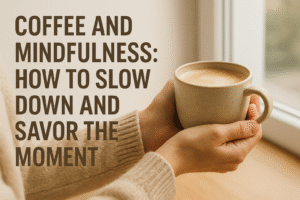Coffee is often viewed as either a guilty pleasure or an energizing necessity. But what if it could be something more—a thoughtful, integrated part of a balanced wellness lifestyle?
For many, coffee is more than a drink. It’s a ritual, a comfort, a stimulant, and a social connector.
In this article, we’ll explore how coffee can support various pillars of wellness—mental, physical, emotional, and even social—when consumed with intention.
You’ll also learn how to enjoy coffee in a way that complements your health goals without overreliance or imbalance.
Redefining Coffee as a Wellness Ally
Wellness isn’t about restriction—it’s about harmony. A wellness lifestyle embraces habits that support long-term vitality, clarity, and joy. When thoughtfully consumed, coffee can play a positive role in that journey.
It offers mental stimulation, antioxidant support, digestive benefits, and a structured pause in busy days. The key is to avoid using coffee to mask poor habits and instead allow it to enhance an already balanced routine.
Coffee and Mental Clarity
One of the best-known effects of coffee is its ability to improve focus, attention, and cognitive function. Caffeine blocks adenosine receptors in the brain, reducing fatigue and increasing alertness.
When consumed in moderate doses, coffee supports:
- Enhanced concentration
- Better short-term memory
- Improved reaction time
- Reduced mental fog
It’s ideal to align coffee intake with periods of deep work or study, using it to support intentional mental effort—not as a crutch for poor sleep or burnout.
Emotional Wellness and Ritual
There’s a reason coffee is deeply comforting: it supports emotional wellness through ritual and sensory experience.
The act of brewing coffee can become a mindful pause—a way to start the day slowly, reflect during a break, or connect with yourself in moments of stillness.
Emotional wellness is about creating space for calm, and the rhythm of coffee preparation can:
- Provide structure in chaotic routines
- Ground your senses in the present
- Encourage mindful breathing and slowing down
- Offer simple joy through aroma, warmth, and taste
Coffee rituals can also be tied to journaling, gratitude practice, or meditation, creating a holistic wellness moment.
Physical Health Benefits
Coffee’s impact on physical health is often misunderstood. When consumed in moderation—1 to 3 cups per day—coffee can offer real benefits.
1. Antioxidants
Coffee is a leading source of antioxidants in the modern diet. These compounds help fight free radicals, reduce inflammation, and support cellular health.
2. Metabolic support
Caffeine can slightly boost metabolism, promote fat oxidation, and improve energy availability during workouts.
3. Liver health
Studies have shown that coffee consumption may reduce the risk of liver diseases, including cirrhosis and liver cancer.
4. Brain protection
Long-term coffee consumption has been linked to a reduced risk of Alzheimer’s and Parkinson’s diseases.
However, balance is key. Excessive consumption (more than 400 mg of caffeine daily) can lead to:
- Anxiety
- Digestive upset
- Elevated heart rate
- Poor sleep quality
Stay aware of how your body responds and make adjustments based on energy, digestion, and rest.
Social Wellness and Connection
Coffee is also a powerful tool for social connection, which is essential to holistic health.
From coffee shop meetups to casual kitchen chats, coffee provides a natural setting for:
- Deep conversation
- Professional networking
- Shared breaks with coworkers
- Emotional support between friends
These small moments of interaction can reduce stress, improve mood, and reinforce your social support network—all key factors in emotional and mental resilience.
Coffee and Movement
Pairing coffee with physical activity can support wellness in two ways.
First, drinking coffee 30 to 60 minutes before a workout may:
- Improve endurance and performance
- Increase alertness and motivation
- Delay fatigue during exercise
- Promote fat oxidation during cardio
Second, coffee can be a post-workout ritual. Enjoying a warm cup after stretching or cooling down helps you transition into the recovery phase of your day.
Just be sure to hydrate as well—coffee is not a substitute for water.
Coffee and Digestion
Many people find that coffee stimulates digestion, especially in the morning. It encourages bowel movements and may support gut motility.
However, some may experience:
- Acid reflux or stomach discomfort
- Overstimulation if consumed on an empty stomach
- Irritation from additives like sugar or milk
To enjoy the digestive benefits without the downsides:
- Choose low-acid or medium-roast coffee
- Drink after a light meal or with food
- Use clean water and quality beans to reduce bitterness
If you’re sensitive to caffeine, try half-caff blends or cold brew, which are often gentler on the stomach.
Coffee and Sleep Hygiene
Wellness includes quality sleep, and coffee’s timing matters.
Avoid caffeine 6 to 8 hours before bed, especially if you’re a light sleeper. Afternoon or evening coffee can:
- Delay melatonin production
- Reduce deep sleep stages
- Lead to fragmented rest
Instead, shift your last cup to before 2 PM, or opt for decaf in the evening. You’ll still enjoy the ritual without compromising your rest.
Avoiding Dependency and Overuse
Coffee is best enjoyed as a supportive habit, not a dependency. Signs you may be overdoing it include:
- Needing multiple cups just to feel normal
- Experiencing withdrawal headaches
- Feeling jittery or anxious
- Using coffee to mask fatigue or burnout
To rebalance, consider:
- Taking a “coffee reset” for a few days
- Swapping in herbal tea or chicory root
- Exploring lower-caffeine beans or brewing styles
Let coffee be a partner in wellness, not a patch for imbalance.
Tips for Integrating Coffee Into a Wellness Routine
- Start your day with water, then coffee
- Drink mindfully, not while rushing
- Pair coffee with movement, journaling, or sunlight
- Avoid sugar-heavy coffee drinks
- Choose quality beans, freshly ground and brewed
- Respect your caffeine cut-off time
- Reflect on how coffee makes you feel—adjust intake accordingly
Small, thoughtful changes can elevate coffee from a casual habit to a wellness ally.
Conclusion: Intentional Coffee, Intentional Living
Coffee can be a meaningful part of a balanced wellness routine when consumed with awareness. It offers mental clarity, physical support, emotional grounding, and social connection—all essential ingredients for a vibrant life.
The key is to enjoy coffee with intention, moderation, and mindfulness. When you do, that simple daily cup becomes much more than a beverage—it becomes a moment of alignment with your healthiest self.

Marcio Luzardo is a coffee enthusiast and the voice behind Tudo Viraliza. With a passion for turning curiosity into practical knowledge, he shares easy-to-follow tips, guides, and insights to help readers enjoy better coffee every day. When he’s not writing, Marcio is exploring new brewing methods or diving into the rich stories that connect coffee to culture, lifestyle, and wellness.



